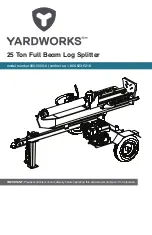
Summary of Important Safety Information for Operation
33
that could cause blood poisoning, infection, disability, gangrene, amputation, or death. Therefore, the following
instructions should be heeded at all times when inspecting or servicing the hydraulic components of the log splitter:
Do not remove the hydraulic oil fill cap when the engine is running. Hot oil can escape causing severe burns.
Allow log splitter to cool completely before removing hydraulic oil fill cap.
Do not adjust the pressure setting of the pump or valve.
Do not check for leaks with your hand. Leaks can be located by holding a piece of cardboard or wood (at least
two feet long) with your hand at one end and passing the other end over the suspected area (wear eye protection).
Look for discoloration of the cardboard or wood.
Stop the engine, disconnect the spark plug, and move all control valve handles back and forth to relieve pressure
before changing or adjusting hydraulic system components such as hoses, tubing, fittings or other components.
If injured by escaping fluid, no matter how small the wound is, see a doctor at once. A typical injection injury
may be a small puncture wound that does not look serious. However, severe infection or reaction can result if
proper medical treatment is not administered immediately by a doctor who is familiar with injection injuries
Spark arrestor muffler
. If the engine is equipped with a spark arrestor muffler, clean and inspect it regularly
(follow manufacturer’s service instructions). Replace if damaged.
Tires
. Be sure tires are fully inflated and in good repair before towing the splitter. When adding air to tires, do not
over-inflate -- serious injury could occur if tire explodes.
Guards / shields.
Make sure all guards and shields are replaced after servicing the log splitter.
Replacement parts.
If a part needs replacement, only use parts that meet the manufacturer’s specifications.
Replacement parts that do not meet specifications may result in a safety hazard or poor operation of the log splitter.
Safety During Fueling
Gasoline is highly flammable and explosive. You can be burned or seriously injured when handling fuel. Use extreme
care when handling gasoline:
Fuel outdoors
. Fill fuel tank outdoors – never indoors. Gasoline vapors can ignite if they collect inside an
enclosure. Explosion can result.
Use approved container
. Never pump fuel directly into engine at gas station. Static charge can build and ignite
fuel. Use an UL approved fuel container to transfer gas to the engine.
Running / hot engine
. A running engine is hot enough to ignite fuel. Never add fuel or remove gas cap if engine is
running or still hot. Stop the engine and allow to cool at least two minutes before adding fuel.
Heat / flames / sparks
. Stay away from sources of heat, flame, or sparks while adding fuel.
Don’t overfill
. DO NOT overfill the gas tank. Allow at least 1/2” of empty space below the fill neck to allow for
fuel expansion.
Replace cap
. Replace gas cap securely before starting engine.
Spills
. Clean up fuel spills immediately. Move log splitter away from spilled fuel on the ground. Wipe fuel off
engine and wait 5 minutes for excess fuel to evaporate before starting engine. Gas soaked rags should be disposed of
properly.
On skin / clothes
. If gasoline is spilled on your skin or clothes, change clothes and wash skin immediately.
Gasoline storage
. Store gasoline in a cool, dry place in an UL approved, tightly sealed container.
.
Safety in Work Site Selection
●
Spark arrestor
. If your splitter will be used near any unimproved forest, brush, or grassy covered land, then engine
should be equipped with a spark arrestor. See the “Specifications” section of this manual to determine if your splitter
already has a spark arrestor. Make sure you comply with applicable local, state and federal codes.
●
Hot exhaust
. Hot exhaust fumes from engine can cause fire. Position muffler at least 7’ from combustible objects
during operation.
●
Fire extinguisher
. Have a Class B fire extinguisher available as a precautionary measure when operating the log
splitter in dry areas
.
●
Level, dry surface
. To prevent accidental falls and equipment tip over, make sure the splitter is situated on a dry,
level surface with good footing. Stay clear of areas with mud, ice, tall grass, weeds, or brush.
























